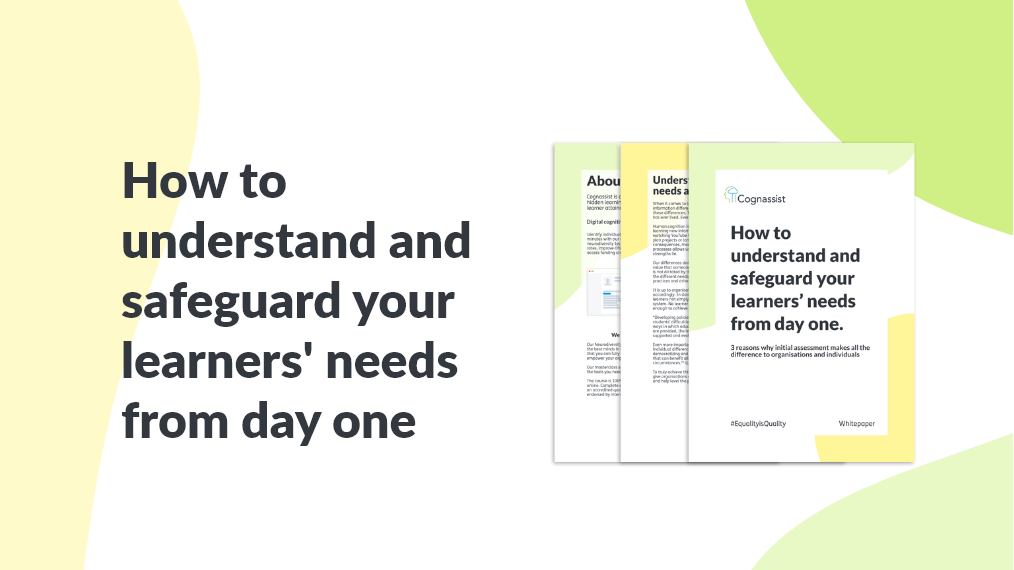Do you understand and safeguard your learners’ needs from day one?

#EqualityIsQuality#EqualityIsQuality – Every learner that walks through your doors has a unique set of abilities, challenges and a different way of thinking. It is your job to understand your learners’ needs throughout their time with you and ensure they receive the support that helps them to achieve the best possible outcomes.
However, without the right tools, identifying how you can support every individual in their learning journey and which learners require tailored support becomes that much harder, risking the learner’s chances of success. This is not a situation that educators want for their learners, and it’s one that none of us should stand for.
Understanding neurodiversity and supporting cognitive differences can help providers to implement reasonable adjustments and one to one support that enables more learners to gain confidence and learn in a way that works for them.
- But how quickly can you identify learning needs?
- Are you relying on learners to self-disclose?
- Or are you looking to your staff to recognise these support needs during the learning journey?
- What about initial assessment?
“Early initial assessment had a positive impact on the take-up of learning support, a key factor in improving success rates. Where data were available, apprentices who received learning support as a result of initial assessment did as well as, or better than, those who did not require it.” (Ofsted, 2010)
It is not good practice to wait and see if learners start to struggle before offering support. Yet this situation is often the reality for many, and it has consequences. Consequences for confidence and mental health, where learners internalise their difficulties, struggle to cope and feel unable to continue their course. Providers often only find out there is an issue when learners have reached breaking point, and the support that tutors can provide is too little, too late.
“The level of support non-completers received varied across the sample. Whilst some non-completers were positive about the support they had received from a range of people (including tutors, providers, partners, employers, colleagues, and peers), this was ultimately not enough to enable them to continue.” (Department for Education, 2019)
We must be proactive.
According to the National Achievement Rates Tables (NARTs), learners with identified learning difficulties and disabilities (LDD) are more likely to drop out of their apprenticeship. At Cognassist, learners who identify with significant learning needs on our assessment are also more likely to live in areas with higher levels of both Income and Education, Skills and Training deprivation. Statistics like these should be all the evidence we need to prioritise learning support and ensure we’re doing the very best for learners.
Having due regard for every learner’s needs and taking steps to reduce the disadvantages that many learners experience relies on building clear starting points.
“[I]f you don’t know your learners and your apprentices, you can’t be planning learning and supporting learning for them. To me, the most fundamental thing that everybody needs to get right is the initial assessment and the robust and accurate identification of starting points. With initial assessment, it’s also a real opportunity to identify learning needs so you can quickly put support in place, and not leave it until that person becomes disengaged.” (M. Gaze, 2021)
Whether or not you are able to identify different learning needs within your cohort, you have an obligation and moral duty to do this. Few providers may be aware that this expectation comes from a legal precedent, one set out in the Equality Act 2010.
Not knowing if a learner requires support or hoping for learners to self-declare is not enough.
Understanding your responsibilities, responding to learners’ needs and strengths and delivering on your Equality Duty are vital to ensuring a quality provision that stands up to inspection.
Cognassist’s latest whitepaper “How to understand and safeguard your learners’ needs from day one” offers insight into why initial assessment makes all the difference to organisations and individuals. Examining our collective responsibility under the Equality Act 2010 and best practice from an Ofsted and quality assurance perspective. All to improve outcomes for learners and remove barriers in education.












Responses